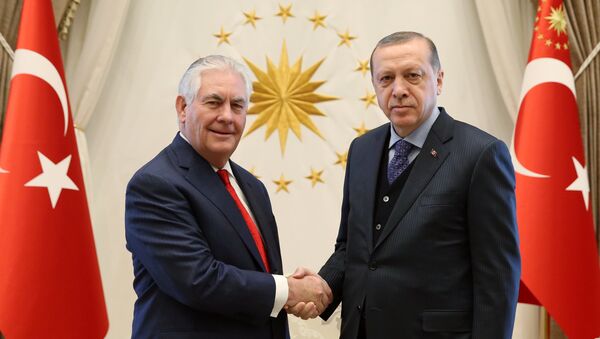During the March 30 visit, Tillerson had to get acquainted with the Turkish leadership and attempt to defuse bilateral tensions which Mirzayan said could end in a severance of US-Turkish relations.
"After all, Turkey, which independently resolves issues of cooperation with Russia and Iran, creates problems for Americans. Especially given that it is still a NATO member and any problems pertaining to Turkey immediately become NATO problems," Mirzayan said.
Although Tillerson was able to meet with Turkey's leader, he was unable to meet his key objective of dispelling key tensions between the countries, Mirzayan added, referring to Tillerson's unwillingness to reach a compromise with Ankara on Gulen's alleged role in Turkey's coup and the Kurdish problem.
The Gulen Issue
Gulen, an Islamic cleric who lives in Pennsylvania, remains one of the most serious opponents of Erdogan and remains a thorn in his side despite his exile.
The cleric allegedly controls a whole network of supporters in Turkey and is working to prevent Erdogan from building the sultanate. Mirzayan recalled that Gulen's extradition could prompt Erdogan to make considerable concessions to Washington.
Tillerson's first Turkey visit ends in impasse as US shifts position on Assad https://t.co/KrVqbXsrZa pic.twitter.com/nM1OSmGE7O
— dwnews (@dwnews) 31 марта 2017 г.
"However, Tillerson and Erdogan failed to agree on the extradition because actually, President Trump cannot extradite Gulen, who allegedly cooperates with US intelligence. According to some sources, US intelligence often uses Gyulen's network structures to realize their goals," Mirzayan said.
Considering the already-complicated relations between Trump and the CIA, the US President is unlikely to spoil them even further, he added, not ruling out that Gulen could become a lever for the White House to put pressure on the CIA.
The Kurdish Problem
Mirzayan recalled that President Erdogan demands that the US stop supporting the Syrian Kurds.
He quoted Turkish Foreign Minister Mevlut Cavusoglu as saying that "the United States recognizes the Kurdish People's Self-Defense Forces and the Democratic Union Party as terrorist organizations but despite this, America continues to help them, and this affects our bilateral relations."
"For Washington, the choice is, in fact, obvious. They are not going to abandon the Kurds, because it is the Kurdish forces who are advancing on Raqqa, Daesh's self-proclaimed capital in Syria. Also, it is the Kurds who do not set any specific conditions for the Americans, who need the Kurds much more than Erdogan," Mirzayan said.
In addition, he added, the Turks themselves say that they will not participate in the liberation of Raqqa, with Erdogan insisting that to fight terrorism, the US should rely on "legitimate" partners.
What's more, Turkey currently urges both the White House an Tillerson to make a choice between "Turkish allies" and "Kurdish terrorists."
"In the US, the people of Turkey have a trusted ally and a partner who is committed to its safety and security and advancing economic opportunity. … The Trump administration will continue to build ties with the long-standing ally and our friend," Tillerson said at a press briefing in Ankara.
Turkey and the United States will stay together as part of the US-led coalition seeking to defeat Daesh, he added.
Never miss a story again — sign up to our Telegram channel and we'll keep you up to speed!




